"People go to prison but that punishment doesn't have to extend to their children" Mia's Story reveals what a Lancashire child needed to know when dad went to prison
and live on Freeview channel 276
"Even though my Dad was away from me in prison, I never stopped loving him. If I could speak to other children going through this right now, I would tell them to have hope, there are people who can help and they deserve to have a life as good as it can be."
The words of Lancashire schoolgirl, Mia, aged 10, sum up a universal truth - the hidden victims of a custodial sentence are often the prisoners' children.
Advertisement
Hide AdAdvertisement
Hide AdUntil now it seems little has been done to help those youngsters through a very difficult and challenging time in their lives.
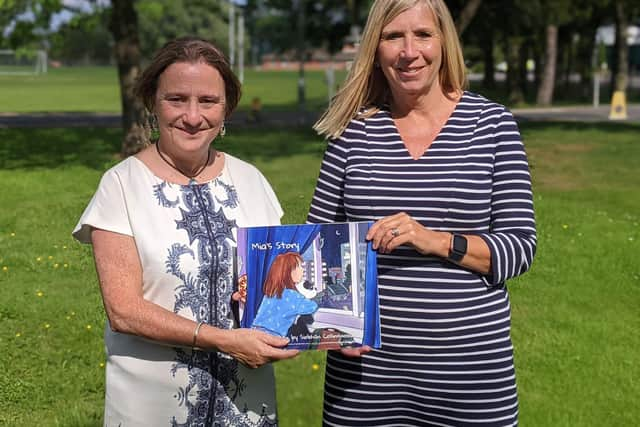

They are caught in a cross fire of emotions when mum or dad is sent to jail. They may be told their parent has gone away to work, they may be told the truth. They may be so ashamed they don't want their teachers or friends to know.
So begins a journey for these hidden victims that is both isolating and painful and can impact their future lives, confidence and aspirations, their mental health and educational attainment and even their risk of offending.
In Lancashire some 6,000 to 7,000 children are directly affected by having a parent in prison. According to Barnardos there are currently 310,000 children in the UK who are separated from a parent who is in jail.
Advertisement
Hide AdAdvertisement
Hide AdDetective Chief Superintendant Sue Clarke, head of the Lancashire Violence Reduction Network, said: “This is a group of children that are completely unsighted by the education and criminal justice system...It needs to ignite a wider conversation about the aspirations we have for young people wherever they live.""
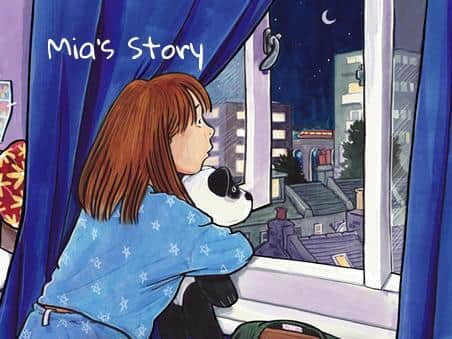

It is to counter this isolation and help them that a new mini picture book Mia's Story has been written. Mia is not her real name, but her experience is very real. She shared her worries, fears and uncertaintities about her dad being in prison.The 36 page book, is also designed to help prisoners understand how to begin to bridge the divide their sentence creates. From prison visits and being released "on tag" to prison food and prisoners' jobs many questions youngsters may wonder about are answered.
Mia's Story, produced by the Lancashire Violence Reduction Network, is already gaining national recognition and was born out of the experiences of Mia, the then eight year old daughter of a Lancashire prisoner and of prisoners in Lancashire and Cheshire. The prisoners were asked what they thought their families needed to know about their life in prison and their preparations to come home. Mia was shown their words and responded with an explanation of how she felt.
The book, written by newly retired headteacher Siobhan Collingwood, who is Education Lead at the Network is illustrated by Karen Donnelly, with graphic design by Nicholas Lowe of Lancashire Constabulary and comprises letters from a fictional father and Mia's responses.
Advertisement
Hide AdAdvertisement
Hide AdSiobhan, who retires this summer from her post as head of Morecambe Bay Community Primary School and has worked in primary schools in Penwortham, Heysham and Carnforth, said: "“In Lancashire there are 3.5 times more children directly affected by parental incarceration than there are children in care. I have seen how what’s happening at home affects a child’s wellbeing, their behaviour and their future adult life. When a parent goes into prison, services need to work harder to support family relationships where possible to help children go through the trauma of being separated and come out at the other end as well-adjusted as possible.”
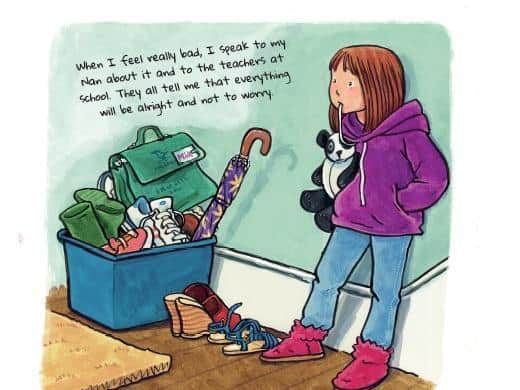

Prior to working with the Network she worked with the county's Safeguarding Children Board. As part of the Network's work to prevent violent crime and reoffending it had become apparent how early childhood trauma influences future adult behaviour.
She admits that in her teaching career she had not fully appreciated the help and support children of prisoners need, the number of children affected by a parent's custodial sentence or the extent of the grief felt at separation from a parent. This is compounded by an ongoing sense of stigma and shame. Siobahn said: "The families in the vast majority don't tell the school the child is going through this experience. As the child becomes increasingly upset with things there's nobody aware of it in school to help them."
She said talking to Mia for the book demonstrated how much more can be done to help youngsters : "Because nobody talked about dad in prison she thought he was living like Mr Bean in the cartoon where he is in a stripey outfit, being beaten up by other prisoners, sleeps on a board in a corner of a room with no toilet, because there was a vacuum of information that got filled with stereotypical or untruthful or invalid images in her head...Then she needed support to maintain a relationship with her dad."
Advertisement
Hide AdAdvertisement
Hide AdSue Clarke said in her police career she has seen how children can be left with a feeling of abandonment and a cycle of trauma can be set off. On a practical level the family will also have taken a financial hit with the prisoner's loss of earnings: "You see then a whole catalogue of things starts to happen. If there is bad behaviour at school, a child can be excluded. We're hoping by raising it in public minds people will be slightly more understanding and more importantly the young person will feel free to ask for help and support when needed. Unfortunately sometimes people get drawn into gangs and other criminal activity because those people show them a bit of warmth and affection and they get drawn in.""
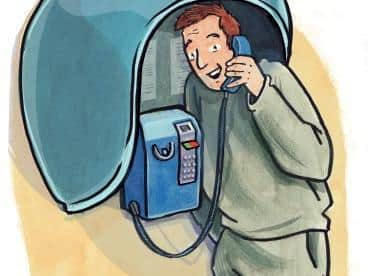

Sue said she knew of cases where a child is told the parent has gone to work away: "But they are actually going to visit the parent in prison. They clearly know they are not at work but don't feel able to say. They don't want to rock the boat and upset other adults in their lives. If you put yourself in that place 'Who's telling me the truth here? Am I secure in my reality?' People go to prison...but that punishment doesn't have to extend to their children."
Recalling how in Glasgow an expert had talked of the people he worked with as having " a lethal absence of hope". She said: "We don't want these young people to have a lethal absence of hope. We want them to have aspirations to thrive to do all the things we want for our own families."
She continued: "At Lancashire Violence Reduction Network we are working to encourage more support within schools and also within prisons. This must be at a specialist level in order to provide an effective and ongoing programme of support which protects children through the whole experience from the parent going to prison, to visiting prison, planning for release and after release.”
Advertisement
Hide AdAdvertisement
Hide AdA thousand copies of Mia's Story have already been distributed to Lancashire primary schools. The Network has also provided training to staff at 450 schools and 100 social care staff on the impact of parental incarceration’
It's envisaged the book will be shared between parents, carers, support staff and children, and prisoners and their support staff to spark discussion and help children to understand that they are not alone.
Mia says she hopes the story will help others. She said: "I feel really proud and happy about my book. When I think back to how upset I was at the time, I can see how much better things have got for me. I'm so happy that by sharing my feelings from back then, I have been able to help others who are going through the same thing.I hope our book is used by a lot of people and helps families to stay in touch so that they can understand what life is like for each other."
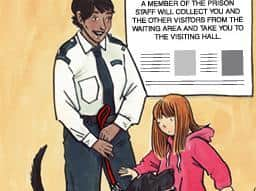

Andrew Snowden, Lancashire's Police and Crime Commissioner , praised Mia for sharing her experiences and said: "Ensuring that young people whose parents go through the criminal justice system get support is really important – the children of offenders are in many ways secondary victims themselves and projects like this, with 'Mia' bravely telling her story, will help anyone dealing with something similar."
How to Help
Advertisement
Hide AdAdvertisement
Hide Ad"Communities are often unaware of what’s happened or don’t know what to say, what to ask, or what not to ask, leaving children and their family coping with the void of the person who has gone and the additional pressures that brings."
The Lancashire Violence Reduction Network advises families, teachers, support workers, and communities to:
* Talk honestly and sensitively about what has happened as much as possible
* Support children in maintaining a relationship with their parent wherever possible
Advertisement
Hide AdAdvertisement
Hide Ad* Arrange for children to visit their parent in prison to help dispel any negative or sensationalised images of prison life
* Support children through any unkind comments, gossip, or feelings of shame or embarrassment they may experience
* Support children and their family as they prepare to reintegrate when the imprisoned parent comes home
* Be kind.
* The Lancashire Post is more reliant than ever on you taking out a digital subscription to support our journalism. For unlimited access to Lancashire news and information online, you can subscribe here.